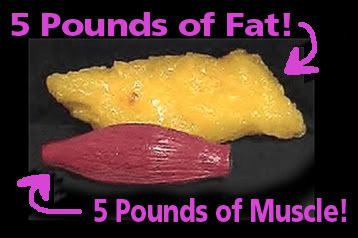Muscle Vs. Fat
Options

End6ame
Posts: 903
I see a lot of posts on here that mention things like “turning fat into muscle”, “muscle does NOT weight more than fat”, and various other muscle vs. fat misconceptions.
The truth is that 1lb of muscle does, in fact, weight the same as 1lb of fat (no kidding right.) But the volume of fat required to make up 1lb is much greater than the volume of muscle required to make up 1lb because muscle is denser that fat. So you can pack much more muscle inside of a smaller space than you can fat. Additionally, it is physically impossible to turn fat into muscle, they are two completely different types of tissue. You can burn fat and gain muscle, but one will never transform into the other.
The best way to think about muscle and fat is the same as steel and wood. If you take a 1’x1’x1’ block of steel and a 1’x1’x1’ block of wood, the steel will weigh much more. Steel is denser, stronger and more rigid much like muscle is to fat; and no matter how hard you try you can not turn wood into steel.
So what does all of this mean? It means that having a focus on “weight loss” is a very poor measurement of fitness and healthiness. In other words, stop worry about what the scale says and start taking body measurements instead. Focus on fat loss.
Take a look at the following graphic and you tell me who is healthier. Both men are the same height, weight and BMI.

The truth is that 1lb of muscle does, in fact, weight the same as 1lb of fat (no kidding right.) But the volume of fat required to make up 1lb is much greater than the volume of muscle required to make up 1lb because muscle is denser that fat. So you can pack much more muscle inside of a smaller space than you can fat. Additionally, it is physically impossible to turn fat into muscle, they are two completely different types of tissue. You can burn fat and gain muscle, but one will never transform into the other.
The best way to think about muscle and fat is the same as steel and wood. If you take a 1’x1’x1’ block of steel and a 1’x1’x1’ block of wood, the steel will weigh much more. Steel is denser, stronger and more rigid much like muscle is to fat; and no matter how hard you try you can not turn wood into steel.
So what does all of this mean? It means that having a focus on “weight loss” is a very poor measurement of fitness and healthiness. In other words, stop worry about what the scale says and start taking body measurements instead. Focus on fat loss.
Take a look at the following graphic and you tell me who is healthier. Both men are the same height, weight and BMI.

0
Replies
-
Thanks Greg, this is so hard to get across to the general weight loss client...I might borrow!0
-
Yes, that is true and thank you for trying to reiterate that fact to the community but telling women to ignore the scale can be pretty hard considering the whole reason we are here in the first place it to go back to a societal norm, whether consciously or unconsciously we are all striving for beauty by being skinny.
That of course being said if mainly for those like myself trying to loose vanity pounds (while building muscle of course), the people who are overweight, MFP is definitely a good tool to get healthy and posting facts like you did is good information to share.
The graphic really demonstrates how flawed the BMI system is especially for men.0 -
I like how you put it....I too will borrow it and share it to others......Thanks0
-
FANTASTIC!!! A picture is soooo useful in getting my mind around this concept.
THANKS!
~ Sara0 -
bump
funny - i was just saying the other day: a pound is a pound is a pound.
but yeah, there is definitely that 'fluffyness' factor to the fat: they say when you lose 5#, you lose the volume of a LOAF OF BREAD from your body!0 -
The guy on the right is heathier because the guy on the left is loaded with Steroids which gives him fits of rage and heart problems :laugh:0
-
Kinda off subject but this reminds me of an elementary school riddle I heard many many moons ago. "What weighs more? A ton of bricks or a ton of feathers? Neither. They both weigh a ton! There are just many many more feathers than bricks to make up that ton!" HAPPY FRIDAY! :bigsmile: :bigsmile: :bigsmile:0
-
Thanks for posting this its very helpful
 0
0 -
a lady at my gym is the same hight as as me and weighs ten pound less, she has more body fat than I do. So like I have always said, "be aware of body measurement and dont worrie about what the scale says". We only know what the scale says to us, everyone else sees our bodies.0
-
Yes your post is true for the most part, and I've also been preaching that song for a long time, but the scale is relevant simply because gaining muscle mass is VERY SLOW and most people will lose weight/fat faster than they gain muscle, especially on a severe caloric restriction.
Dedicated body builders in a caloric SURPLUS would jump for joy if they could add 5 lbs/month of muscle mass (not weight overall).0 -
Thank you for the post, and the picture helps too.:flowerforyou:0
-
Yes your post is true for the most part, and I've also been preaching that song for a long time, but the scale is relevant simply because gaining muscle mass is VERY SLOW and most people will lose weight/fat faster than they gain muscle, especially on a severe caloric restriction.
Dedicated body builders in a caloric SURPLUS would jump for joy if they could add 5 lbs/month of muscle mass (not weight overall).
Agreed muscle growth is much slower than people think. However, in beginner strength trainers it does come quicker. I have been able to increase all of my lifts 5lbs every gym day up until just recently on a calorie deficit for net 0 weight gain.0 -
Yes your post is true for the most part, and I've also been preaching that song for a long time, but the scale is relevant simply because gaining muscle mass is VERY SLOW and most people will lose weight/fat faster than they gain muscle, especially on a severe caloric restriction.
Dedicated body builders in a caloric SURPLUS would jump for joy if they could add 5 lbs/month of muscle mass (not weight overall).
Agreed muscle growth is much slower than people think. However, in beginner strength trainers it does come quicker. I have been able to increase all of my lifts 5lbs every gym day up until just recently on a calorie deficit for net 0 weight gain.
This isn't muscle mass increase most likely. It's probably just the concept of % muscle recruitment. See most people use only a % of muscle fibers in each bundle (what we refer to as a muscle), when you weight train, you train the motor unit (the group of neurons and nerves that connect your brain to a specific muscle fiber bundle) to recruit a higher percentage of the fibers, allowing you to use more power in that muscle. For the first 4 to 8 weeks of a new strength routine, you usually won't gain any muscle mass, you increase muscle recruitment. You notice power gains first, very quickly, then you notice size increase, which also isn't muscle mass, it's increased glycogen at the muscle site to account for the higher levels of muscle fiber being recruited. Only when the muscle fiber recruitment is at or near 100% (usually about 95 to 98% is about as high as it will go) will you begin to increase muscle mass at a specific site.
Thus the reason why it takes so long to increase muscle mass. (It's kinda depressing if you ask me).0 -
We've all seen this picture, but just a reminder that 5 pounds of muscle is much smaller than 5 pounds of fat!
 0
0 -
great post, thank you!!0
-
We've all seen this picture, but just a reminder that 5 pounds of muscle is much smaller than 5 pounds of fat!

plus the fat is icky looking! lol0 -
The guy on the right is heathier because the guy on the left is loaded with Steroids which gives him fits of rage and heart problems :laugh:
If that makes you feel better, sure...0 -
We've all seen this picture, but just a reminder that 5 pounds of muscle is much smaller than 5 pounds of fat!

Well put!! Thanks!0 -
Yes your post is true for the most part, and I've also been preaching that song for a long time, but the scale is relevant simply because gaining muscle mass is VERY SLOW and most people will lose weight/fat faster than they gain muscle, especially on a severe caloric restriction.
Dedicated body builders in a caloric SURPLUS would jump for joy if they could add 5 lbs/month of muscle mass (not weight overall).
Agreed muscle growth is much slower than people think. However, in beginner strength trainers it does come quicker. I have been able to increase all of my lifts 5lbs every gym day up until just recently on a calorie deficit for net 0 weight gain.
This isn't muscle mass increase most likely. It's probably just the concept of % muscle recruitment. See most people use only a % of muscle fibers in each bundle (what we refer to as a muscle), when you weight train, you train the motor unit (the group of neurons and nerves that connect your brain to a specific muscle fiber bundle) to recruit a higher percentage of the fibers, allowing you to use more power in that muscle. For the first 4 to 8 weeks of a new strength routine, you usually won't gain any muscle mass, you increase muscle recruitment. You notice power gains first, very quickly, then you notice size increase, which also isn't muscle mass, it's increased glycogen at the muscle site to account for the higher levels of muscle fiber being recruited. Only when the muscle fiber recruitment is at or near 100% (usually about 95 to 98% is about as high as it will go) will you begin to increase muscle mass at a specific site.
Thus the reason why it takes so long to increase muscle mass. (It's kinda depressing if you ask me).
Yes, or also refereed to as 'newbie' gains. However, most people can burn off fat while retaining muscle. The reason the scale doesn't move, or in some cases goes up. Is because you are retaining a lot more water for muscle repair than before. It is VERY hard to gain muscle. But not nearly has hard to keep muscle and lose body fat.0 -
Yes your post is true for the most part, and I've also been preaching that song for a long time, but the scale is relevant simply because gaining muscle mass is VERY SLOW and most people will lose weight/fat faster than they gain muscle, especially on a severe caloric restriction.
Dedicated body builders in a caloric SURPLUS would jump for joy if they could add 5 lbs/month of muscle mass (not weight overall).
Agreed muscle growth is much slower than people think. However, in beginner strength trainers it does come quicker. I have been able to increase all of my lifts 5lbs every gym day up until just recently on a calorie deficit for net 0 weight gain.
This isn't muscle mass increase most likely. It's probably just the concept of % muscle recruitment. See most people use only a % of muscle fibers in each bundle (what we refer to as a muscle), when you weight train, you train the motor unit (the group of neurons and nerves that connect your brain to a specific muscle fiber bundle) to recruit a higher percentage of the fibers, allowing you to use more power in that muscle. For the first 4 to 8 weeks of a new strength routine, you usually won't gain any muscle mass, you increase muscle recruitment. You notice power gains first, very quickly, then you notice size increase, which also isn't muscle mass, it's increased glycogen at the muscle site to account for the higher levels of muscle fiber being recruited. Only when the muscle fiber recruitment is at or near 100% (usually about 95 to 98% is about as high as it will go) will you begin to increase muscle mass at a specific site.
Thus the reason why it takes so long to increase muscle mass. (It's kinda depressing if you ask me).
Yes, or also refereed to as 'newbie' gains. However, most people can burn off fat while retaining muscle. The reason the scale doesn't move, or in some cases goes up. Is because you are retaining a lot more water for muscle repair than before. It is VERY hard to gain muscle. But not nearly has hard to keep muscle and lose body fat.
Yes, sorta. The water is stored in the muscle so that the muscles can store more glycogen (carbs) to be able to fuel the lifts later. So, while technically you aren't gaining muscle fibers, you are getting bigger looking muscles because of the added glycogen and water stored in the muscles. While it's not really muscle, when doing a body composition analysis, it is counted as lean tissue because it isn't stored body fat. Since we can't differentiate between muscle, bones, organs, and water without an expensive DEXA scan, any added lean body mass is looked at as "muscle" in a gym setting by most people because they can't really tell what it is. That's why you have a lot of people who believe they are gaining muscle really fast, especially as they first get started, because they don't know what they've really gained and neither do a lot of their trainers so they get told they've increased Lean Body Mass and assume it is muscle. 0
0
Categories
- All Categories
- 1.4M Health, Wellness and Goals
- 391.9K Introduce Yourself
- 43.5K Getting Started
- 259.8K Health and Weight Loss
- 175.7K Food and Nutrition
- 47.3K Recipes
- 232.3K Fitness and Exercise
- 400 Sleep, Mindfulness and Overall Wellness
- 6.4K Goal: Maintaining Weight
- 8.5K Goal: Gaining Weight and Body Building
- 152.8K Motivation and Support
- 7.9K Challenges
- 1.3K Debate Club
- 96.3K Chit-Chat
- 2.5K Fun and Games
- 3.4K MyFitnessPal Information
- 23 News and Announcements
- 988 Feature Suggestions and Ideas
- 2.4K MyFitnessPal Tech Support Questions














